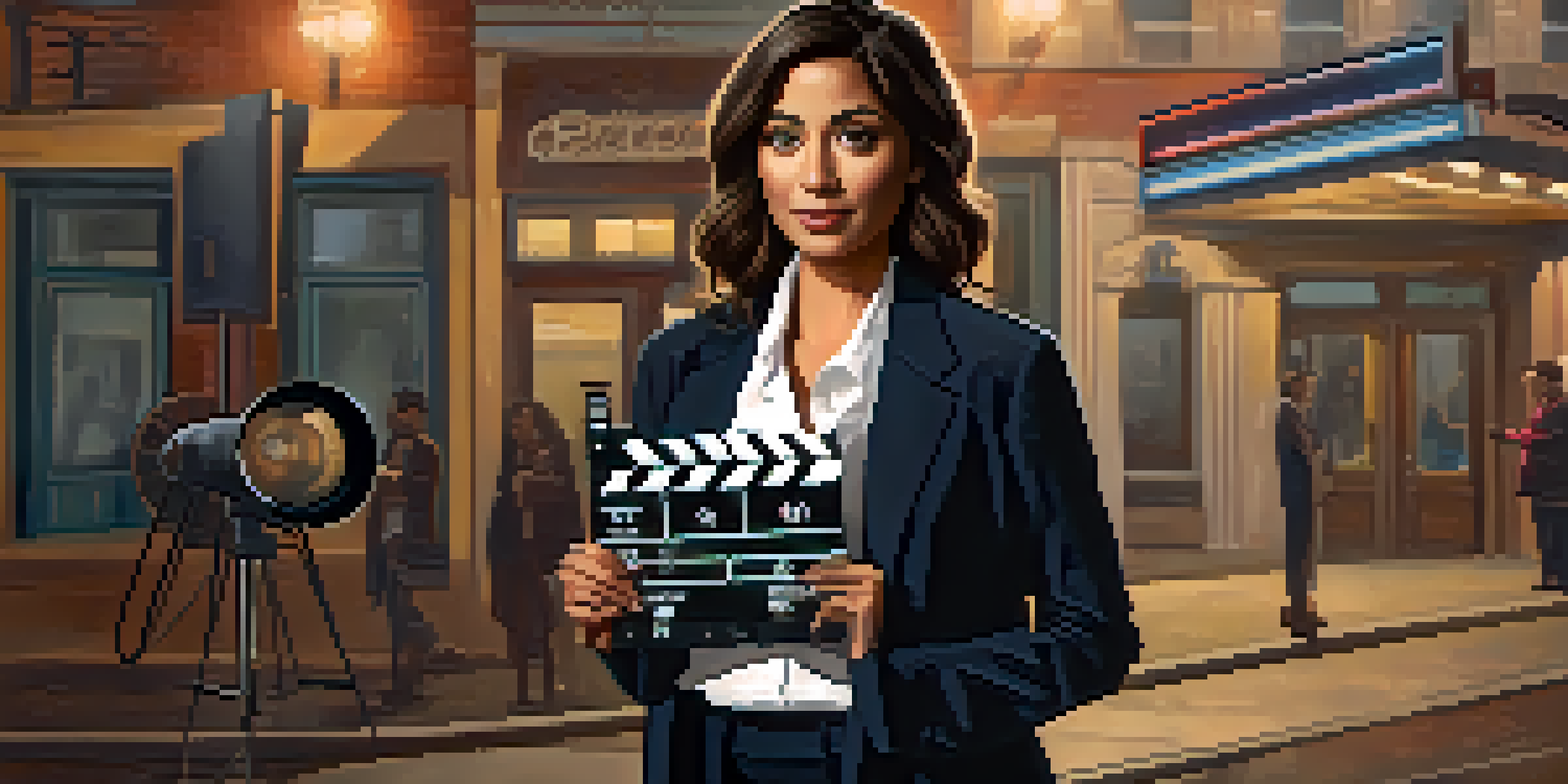Feminist Cinema: Films That Challenge Gender Norms and Stereotypes

Understanding Feminist Cinema and Its Importance
Feminist cinema refers to films that not only showcase women's stories but also challenge the traditional gender roles and norms. By presenting female characters as complex, relatable individuals, these films encourage audiences to rethink societal expectations. This genre plays a crucial role in promoting gender equality and offering diverse perspectives that have often been overlooked in mainstream media.
A feminist is anyone who recognizes the equality and full humanity of women and men.
The importance of feminist cinema lies in its ability to spark conversations around gender issues. Through storytelling, filmmakers can highlight the struggles and triumphs of women, making their experiences visible. This visibility can lead to greater awareness and, ultimately, social change, as viewers begin to empathize with characters that defy stereotypes.
Moreover, feminist films often use humor, drama, and even fantasy to engage audiences, making difficult topics more approachable. Whether it's a light-hearted romantic comedy or a gripping drama, these films serve as a platform for discussing serious issues, such as sexism, misogyny, and the fight for equality.
Breaking Stereotypes: Key Films to Watch
One standout film in feminist cinema is 'Thelma & Louise,' which follows two women embarking on a road trip that turns into a journey of self-discovery. The film defies traditional gender roles by portraying women as adventurous and capable, rather than passive. This narrative shift invites viewers to reconsider the limitations imposed on female characters in cinema.

'Wonder Woman' is another example that challenges stereotypes by presenting a strong female superhero who embodies empowerment. Unlike typical portrayals of women in action films, Wonder Woman is not merely a sidekick; she is a leader who takes charge and fights for justice. This film has inspired many by showcasing a powerful female figure who stands up against oppression.
Feminist Cinema Challenges Norms
Feminist cinema showcases women's stories while challenging traditional gender roles, promoting gender equality and diverse perspectives.
Lastly, 'Lady Bird' offers a more nuanced look at the complexities of growing up as a young woman. It explores themes of identity, family, and independence while steering clear of conventional tropes. By focusing on the protagonist's journey, the film highlights the struggles that many young women face, making it a relatable and impactful viewing experience.
The Role of Female Directors in Feminist Cinema
Female directors have played a pivotal role in shaping feminist cinema, often bringing their unique perspectives and experiences to the forefront. Filmmakers like Greta Gerwig and Ava DuVernay have created powerful narratives that challenge gender stereotypes and elevate women's voices. Their contributions have not only enriched the cinematic landscape but have also inspired future generations of female filmmakers.
The personal is political.
These directors often approach storytelling with a keen awareness of the societal pressures faced by women. By crafting stories that resonate with audiences, they enable viewers to engage with the material on a deeper level. For instance, Gerwig's 'Little Women' reimagines a classic tale, allowing the characters to navigate their ambitions and desires in a way that feels authentic and modern.
Moreover, the impact of female directors extends beyond their individual films. Their success has led to increased visibility for women in the industry, paving the way for more diverse storytelling. As more women take on directing roles, we can expect to see an even broader range of narratives that challenge traditional gender norms.
The Impact of Feminist Cinema on Society
Feminist cinema has a profound impact on society by influencing cultural norms and attitudes toward gender. These films often challenge viewers to confront their own biases and assumptions, fostering a greater understanding of the complexities of gender identity. As audiences engage with these narratives, they may begin to question the status quo and advocate for change in their communities.
Additionally, feminist cinema encourages open discussions around topics like consent, body image, and sexual empowerment. By portraying these issues authentically, filmmakers can help destigmatize conversations that are often considered taboo. This shift in dialogue can empower individuals to share their own experiences and promote a more inclusive society.
Female Directors Drive Change
Female directors like Greta Gerwig and Ava DuVernay are crucial in shaping feminist narratives, inspiring future generations and increasing women's visibility in the industry.
As more films continue to push boundaries, the potential for societal change grows. Feminist cinema serves as a catalyst for dialogue, encouraging viewers to reflect on their values and challenge gender norms. This collective awareness can lead to a more equitable world where diverse voices are celebrated.
The Evolution of Female Representation in Film
The evolution of female representation in film has been a gradual process, marked by significant milestones in feminist cinema. In the early days of Hollywood, women were often relegated to stereotypical roles, such as the damsel in distress or the background love interest. However, as societal attitudes began to shift, filmmakers started to create more multifaceted female characters who could drive narratives.
The 1970s marked a turning point, with the emergence of films that embraced feminist themes, such as 'Alien' and 'The Stepford Wives.' These films began to present women as strong, capable individuals who could take on challenges and defy societal expectations. This evolution laid the groundwork for the diverse portrayals we see in contemporary cinema.
Today, female characters are increasingly depicted as leaders, warriors, and complex individuals. Films like 'Black Panther' and 'Frozen' showcase women in powerful roles, challenging the notion that they must conform to traditional stereotypes. This ongoing evolution reflects broader changes in society, as more women take on prominent roles both in front of and behind the camera.
The Global Perspective: Feminist Cinema Around the World
Feminist cinema is not limited to Hollywood; it has taken root across the globe, showcasing diverse stories and perspectives. International filmmakers have used their platforms to highlight the unique struggles faced by women in various cultural contexts. For example, films from the Middle East and Africa often address issues like gender-based violence and societal oppression, shedding light on the challenges women face in those regions.
In India, filmmakers like Deepa Mehta have created powerful narratives that explore the intersection of gender and tradition. Movies such as 'Water' and 'Fire' tackle issues like caste, sexuality, and women's rights, provoking thought and sparking conversations within Indian society. These films demonstrate the universal nature of feminist themes, transcending cultural boundaries.
Global Impact of Feminist Films
Feminist cinema transcends cultural boundaries, highlighting unique struggles faced by women worldwide and enriching the dialogue around gender equality.
Moreover, feminist cinema from different countries often offers fresh insights into gender norms and stereotypes. By examining how various cultures portray women, we can gain a deeper understanding of the global fight for gender equality. This cross-cultural exchange enriches the genre, creating a tapestry of stories that resonate with audiences worldwide.
Challenges Facing Feminist Filmmakers Today
Despite the progress made in feminist cinema, filmmakers still face significant challenges in the industry. One major hurdle is the persistent gender disparity in funding and opportunities. Women directors often struggle to secure financing for their projects, which can limit the number of feminist films produced. This lack of support can stifle the voices of talented female filmmakers who have important stories to tell.
Additionally, the industry still grapples with deeply ingrained stereotypes and biases. Many filmmakers encounter pushback when attempting to break away from traditional narratives, forcing them to navigate a landscape that can be resistant to change. This can lead to frustration, as creative visions are often compromised in favor of marketability.

However, the growing demand for diverse stories offers hope for the future. As audiences increasingly seek out content that challenges norms, there is potential for change within the industry. By supporting feminist films and advocating for equal representation, viewers can play a crucial role in shaping the future of cinema.